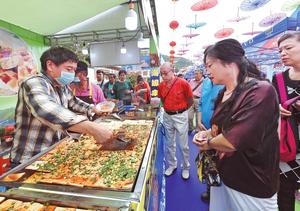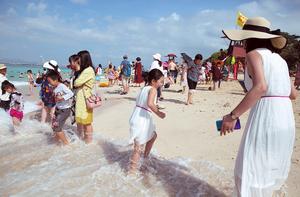China considers more strategies to improve paid vacation mechanism and reduce crowds during holidays
 Visitors participate in winter sports activities at Burqin county, Xinjiang Uygur autonomous region, earlier this month. (SONG YANHUA / XINHUA)
Visitors participate in winter sports activities at Burqin county, Xinjiang Uygur autonomous region, earlier this month. (SONG YANHUA / XINHUA)
"Family trips are more of a burden, especially when they are arranged during the busy season holidays," said Lin Qiang, a 38-year-old financial consultant from Shanghai.
Lin, who has been working as a financial consultant in a Shanghaibased private company for the last 16 years, says because of his busy schedule, he gets to make only a single family trip every year.
"Though the trip can be arranged with the help of paid vacation, it is not that easy," he said.
Most of the people end up traveling to popular holiday spots during the national holidays due to the imperfect paid vacation mechanism
Dai Bin, president of the China Tourism Academy
According to Lin, though he is eligible for a 10-day paid vacation every year as per the labor laws, he has been successful just once.
"My biggest worry is that I am afraid of missing a deal if I take a break as it may be a drag on my monthly performance. The busy work schedule is another aspect that deters me from applying for the same," he said. "Also, my application is often rejected by the department director though it's unlawful."
Due to this, Lin says that he ends up traveling with his family members over some national holidays such as Labor Day and National Day, when the break is usually five to seven days.
"There are huge crowds at tourist attractions and popular destinations at that time. As a result, the overall travel experience, sometimes, is terrible, because of the expensive flight tickets and hotel rates as well as crowded attractions," he said. "What I really want is to take a quiet, uncrowded and peaceful vacation."
Lin adds that he can avoid the rush if he could plan his vacation during some other months. "I can avoid the crowds if I arrange the trip in slack season using my paid vacation. This is what most of the Chinese white-collar workers, especially those with kids, really want."
According to a recent survey from Zhaopin, an online recruitment platform in Beijing, most of the white-collar workers in China are not satisfied with their paid vacations. About 40.7 percent of the respondents did not take their paid vacations last year due to busy work schedules, while about 28 percent of the respondents took paid vacations ranging from one day to five days.
"National holidays are usually the peak period for the tourism industry. Problems such as traffic jams, crowded attractions or shoddy treatment often surface during these holidays and will ultimately influence the sustainable, highquality development of tourism in the country," said Dai Bin, president of the China Tourism Academy (CTA).
 Tourists enjoying local delicacies in Sanya, Hainan province, last month. (ZHANG LIYUN / XINHUA)
Tourists enjoying local delicacies in Sanya, Hainan province, last month. (ZHANG LIYUN / XINHUA)
Policy support
To better people's travel experiences and develop a high-quality, healthy tourism industry, China is taking concerted steps to not only boost tourism facilities and services, but also the paid vacation mechanism in the country.
Last month, 12 central departments including the Ministry of Culture and Tourism, Ministry of Transport and the National Development and Reform Commission jointly released a guideline with specific measures like promoting a reservation system at popular attractions and securing employees' paid vacation through administrative supervision.
I went to Sanya, Hainan province last November purchasing a tour package for about 4,000 yuan (US$581). The same product was priced at over 10,000 yuan during the National Day holiday
Liu Yan, a Shanghai resident
The guideline mentions that travel agencies should strive to offer more diversified tour products to travelers to balance the industry's peak and slack seasons.
Improving paid vacation mechanism is another factor that has been stressed upon. According to the guideline, employees are encouraged to arrange their paid vacation more flexibly and those with schoolgoing children are given priority for paid vacations. In addition, local governments have been urged to draft spring or autumn holiday proposals for school children and encourage parents to take children for family trips via paid vacations in such seasons.
The guidelines have helped bring order to the tourism industry and effectively responds to the frequent concerns of people about holidays, said Dai from the CTA.
"Most of the people end up traveling to popular holiday spots during the national holidays due to the imperfect paid vacation mechanism. The huge crowds at these destinations put great pressure on the tourism infrastructure at these destinations, leading to unsatisfactory experiences," he said.
"Perfecting the paid vacation mechanism as mentioned in the guideline will help unleash people's desire for tourism and consumption," said Dai. "It's not only a policy to boost the economy but also protects employee's rights to rest and leisure."
Staggered travel
Using paid vacations for travel during the slack seasons and avoid national holidays is becoming increasingly popular with young people, though the length of the vacation is often the key determinant for such trips and tourism development, according to travel agencies.
Trip.com Group, an online travel agency headquartered in Shanghai, said the newly released guidelines are positive for the tourism industry as the government will come out with more measures to improve people's travel environment and enhance the paid vacation system.
The company said according to the findings of a survey conducted last year, nearly 90 percent of the respondents had indicated that they were more keen to travel during slack seasons rather than crowding the attractions during popular holidays.
"I prefer to travel over my paid vacation, which I usually take in November," said Liu Yan, a 30-yearold from Shanghai. "I went to Sanya, Hainan province last November purchasing a tour package for about 4,000 yuan (US$581). The same product was priced at over 10,000 yuan during the National Day holiday."
 Children and their parents frolic on a beach in Sanya earlier this month. (ZHANG LIYUN / XINHUA)
Children and their parents frolic on a beach in Sanya earlier this month. (ZHANG LIYUN / XINHUA)
He said that most of his colleagues chose to stay at home during some popular holidays and take paid vacations after the travel rush ends. "The attractions are less crowded and most importantly, flight tickets and hotels are much cheaper. Why should we travel during the national holidays and spend so much of money to get horrible experiences?," said Liu.
Vacations are an effective tool to stimulate productivity and paid vacations help unleash it, Trip.com Group said. "Based on a survey of over 8,000 people across the country we can say that longer or paid vacations are the strongest motivators for trips. Consumption is now a vital driver of economic development in the country. Tourism is an industry with a promising future and it will see sustainable development if the paid vacation mechanism improves further," the company said.
Vacation travails
Chen Lu, a 26-year-old from Beijing, is busy planning her paid vacation. "I plan to take my paid vacation in September or two or three weeks after the Spring Festival holiday when the travel rush subsides."
Though she took up employment in 2018, Chen is in no mood to give up on her paid vacation. "Work is hectic, no doubt, but I need my paid vacation also," she said. "I understand that many of my peers are afraid of upsetting the director by taking a vacation. But I think it is OK to take a paid vacation, especially during nonpeak periods."
Implemented in 2007, China's paid vacation mechanism stipulates that employees who have worked for a year and more but less than 10 years are eligible for a five-day paid vacation, while those who have worked for more than 10 years but less than 20 years can get 10 days of vacation. For those who have worked for more than 20 years, the vacation time has been fixed at 15 days.
Yao Junchang, co-founder of Beijing Weiheng Law Office, a legal advisory firm, said the regulation offers sound protection to workers.
"The company should give double payment to its employees if their vacation applications are rejected."
However, Chen Lu from Beijing, said that most of her senior colleagues do not talk about financial compensation when their paid vacation requests are turned down.
"If you miss the vacation, you will miss it forever," she said. "That's why I do not want to give up my vacation. Another reason is that traveling during popular holidays is terrible. I still remember waiting for a taxi to Beijing South Railway Station for almost three hours ahead of my trip to Wuhan, capital of Hubei province during the National Day holiday in 2019."
Li Qiuyan, general manager of Lvmama's branding department, an online travel agency in Shanghai, said perfecting the paid vacation mechanism is key, but enriching tour products is equally important, be it the peak or slack season.
"The guidelines will help reduce travel expenses and improve people's satisfaction," she said.
"It can also balance the relationship between tourism product supply and demand to make the industry develop on a healthier, safer trajectory."
Contact the writer at chengsi@chinadaily.com.cn


